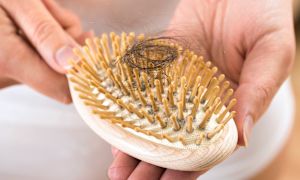Advertisement
Illness, stress, poor nutrition, and certain drugs can lead to hair loss.
Each hair follicle goes through its own cycle of hair growth:
Illness and certain drugs can lead to "anagen effluvium", during which actively growing hairs fall out.
While poor nutrition can affect hair growth, a more common cause of hair loss in teens is a condition called "alopecia areata". This happens when the body's immune cells attack hair follicles, leading to hair loss. Hair disappears in circles on the scalp. In some cases, there is total loss of hair. This condition usually gets better with time.
Another common cause of hair loss in teens is fungal infection. This can appear with scaling (like dandruff) and itching of the scalp. Still another cause of hair loss is pulling hair back tightly or twisting hair.
If hair loss continues, see a doctor for diagnosis and treatment.
Each hair follicle goes through its own cycle of hair growth:
- There is normally a growth phase ("anagen") that lasts two to six years
- Next comes a transition phase ("catagen")
- Then a resting phase ("telogen"), which usually lasts about three months before the growth phase starts over
Illness and certain drugs can lead to "anagen effluvium", during which actively growing hairs fall out.
While poor nutrition can affect hair growth, a more common cause of hair loss in teens is a condition called "alopecia areata". This happens when the body's immune cells attack hair follicles, leading to hair loss. Hair disappears in circles on the scalp. In some cases, there is total loss of hair. This condition usually gets better with time.
Another common cause of hair loss in teens is fungal infection. This can appear with scaling (like dandruff) and itching of the scalp. Still another cause of hair loss is pulling hair back tightly or twisting hair.
If hair loss continues, see a doctor for diagnosis and treatment.

More About this Book
Unlocking the Mysteries of Eating Disorders: A Life-Saving Guide to Your Child's Treatment and Recovery (Harvard Medical School Guides)
A Harvard doctor’s practical, prescriptive, and compassionate approach to healing your child's eating disorder This insightful and comforting guide, written by two internationally known experts,...
Continue Learning about Hair Loss
Important: This content reflects information from various individuals and organizations and may offer alternative or opposing points of view. It should not be used for medical advice, diagnosis or treatment. As always, you should consult with your healthcare provider about your specific health needs.

